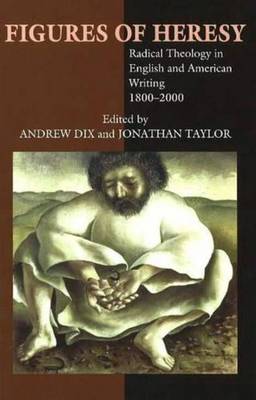
- Retrait gratuit dans votre magasin Club
- 7.000.000 titres dans notre catalogue
- Payer en toute sécurité
- Toujours un magasin près de chez vous
- Retrait gratuit dans votre magasin Club
- 7.000.0000 titres dans notre catalogue
- Payer en toute sécurité
- Toujours un magasin près de chez vous
Figures of Heresy
Radical Theology in English and American Writing, 1800-2000
132,95 €
+ 265 points
Description
God is dead, ' Nietzsche famously declared in The Gay Science; but this book will investigate God's surprising persistence and resurrection in the works of even the most seemingly atheistic of writers, who continue to deploy Judaic and Christian narratives and tropes even as they radically rewrite them in the face of new cultural, political and scientific imperatives. Contributors explore the range, power and implication of Christian and Jewish heresies in canonical Anglo-American writers -- including Edgar Allan Poe, Thomas Hardy, Robert Louis Stevenson, T S Eliot, John Steinbeck and Jim Crace -- as well as in some less familiar texts: the Mormon Scriptures of Joseph Smith and various Victorian rewritings of the Book of Esther. A polemical essay by Michelene Wandor reflects on conceptions of Jewishness, which she finds in need of heretical renewal. Valentine Cunningham's provocative introduction argues that the acts of literary writing and reading are necessarily heretical. A coda to the book, Between Heresy and Superstition', takes as its motto Thomas Huxley's observation in 1881 that It is the customary fate of new truths to begin as heresies and to end as superstitions.' Contributions offer readers a rare opportunity of witnessing an extended academic exchange -- exploring the process by which former heresies may indeed risk ossification as new kinds of doctrinal conformity. Bryan Cheyette's critique of the Christian Albums' of Bob Dylan is answered by Kevin Mills's essay which uncovers heretical possibility even in this most seemingly orthodox part of Dylan's work. The revitalisation of heresy in literary interpretations, as well as in our religious thinking, forms the guiding objective of this exciting critical book.
Spécifications
Parties prenantes
- Editeur:
Contenu
- Nombre de pages :
- 212
- Langue:
- Anglais
- Collection :
Caractéristiques
- EAN:
- 9781845190262
- Date de parution :
- 01-12-05
- Format:
- Livre relié
- Format numérique:
- Genaaid
- Dimensions :
- 157 mm x 218 mm
- Poids :
- 453 g

Les avis
Nous publions uniquement les avis qui respectent les conditions requises. Consultez nos conditions pour les avis.





